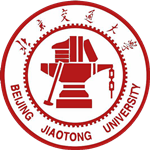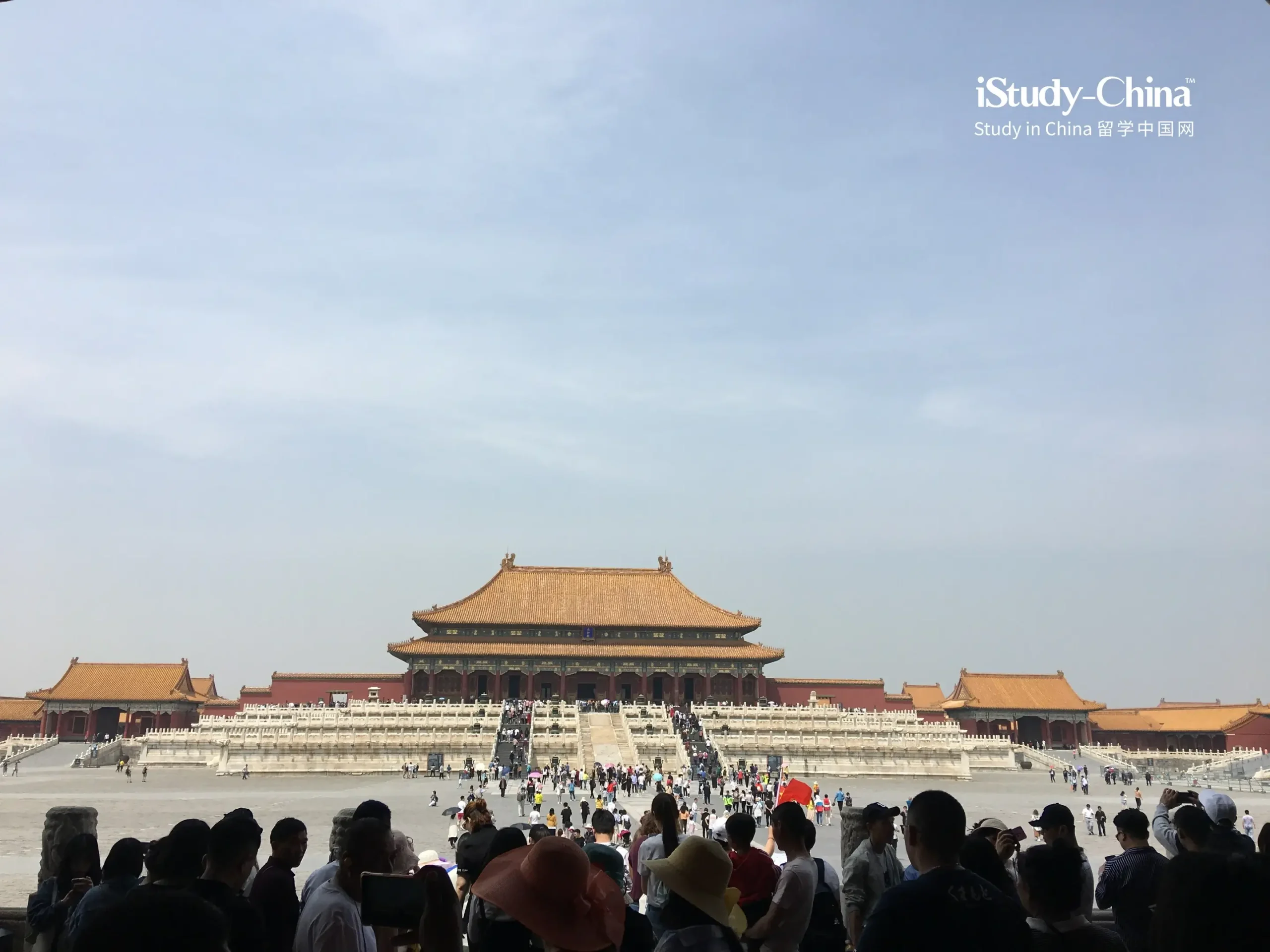School Badge

About Beijing Jiaotong University
Beijing Jiaotong University, a national key university under the direct administration of the Ministry of Education, jointly supported by the Ministry of Education, Ministry of Transport, Beijing Municipal Government, and China Railway Corporation, is also an active contributor to the development of the “National 211 Project”, the “985 Innovative Platforms for Key Disciplines Project”. And the ‘Double First-Class’ construction.As one of the three founding bodies of the Jiaotong University, the history of BJTU can be dated back to 1896. BJTU originated from Beijing Railway Management Institute, China’s first higher education institution committed to fostering railway management talents and was created by the Qing dynasty government. It is the birthplace of modern China’s education in railway management and telecommunication. In 1917, it was divided into Beijing Railway Management School and Beijing Post and Telecommunication School. In 1921, the school merged with Shanghai Industrial College, and Tangshan Industrial College and formed the original Jiaotong University. After the restructuring of Jiaotong University in 1923, the Beijing campus was renamed Beijing Jiaotong University. In 1950, the school was again renamed Northern Jiaotong University with leading bridge expert and scholar Prof. Mao Yisheng as president. In 1952, Northern Jiaotong University was canceled, the campuses at Beijing and Tangshan, therefore, became independent and the school was renamed Beijing Railway Institute. In 1970, the name Northern Jiaotong University was re-adopted. In 2000, the school merged with the Beijing Electric Power College, and the administration was transferred from the Ministry of Railways to the Ministry of Education. In 2003, the name Beijing Jiaotong University was resumed. Numerous renowned scholars and inventors in Chinese history received education in BJTU, including LIU Han, founder of China’s first radio station; YING Shangcai, inventor of China’s first high-power steam engine; JIN Shixuan, author of China’s first railway management monograph; XU Jing, pioneer of railway transport economics in China; YANG Rumei, one of the earliest four major accountants in China, and ZHENG Zhenduo, famous writer, literary critic, and historian. Certain famous academics also taught at the University, including HSIANG Che-Chun, Prosecutor of the Tokyo Trial, and MA Yinchu, a famous demographer and economist in China.
BJTU has two campuses, the East and the West, in the renowned education district Haidian with a total area of nearly 67 hectares and building floorage of more than 1 million square meters. The Weihai International Campus in Shandong Province covers more than 67 hectares. All campuses are equipped with complete teaching and research facilities and enjoy beautiful scenery. In Huanghua, Hebei Province, the university set up the Haibin Rail Transit Comprehensive Research and Development Base. In Beijing, Fengtai District, BJTU constructed the world-leading Fentai Rail Transit ‘Industry-Academia-Research-Application’ Integrated Innovation Base. The Tangshan Research Institute of Beijing Jiaotong University, established in Tangshan, Hebei Province, is dedicated to developing a demonstration zone for technology R&D, commercialization of scientific findings, and international education.
Over the past 120 years, the university has developed a comprehensive and coordinated education system with strength disciplines in information and management, characteristic disciplines in transportation, and other diversified disciplines such as engineering, management, economics, science, liberal arts, law, and philosophy. The university is home to 18 schools, including the School of Electronic and Information Engineering, School of Computer and Information, School of Economics and Management, School of Traffic and Transportation, School of Civil Engineering, School of Mechanical, Electronic and Control Engineering, School of Electrical Engineering, School of Mathematics and Statistics, School of Physical Science and Engineering, School of System Science, School of Languages and Communication Studies, School of Software Engineering, School of Humanities and Social Sciences Marxism, School of Architecture and Design, Law School, School of Environment, School of Information Secret and Security Technology, Zhan Tianyou Emerging Technology College, Weihai International Campus, etc.
The university enjoys strong strength disciplines and has completed its first round of ‘Double First-Class’ university development task – construction of the ‘Smart Transportation’ first-class discipline structure. BJTU’s position in international rankings of world-leading universities and disciplines is steadily on the rise, maintaining its top 500 positions in the ARWU World Ranking. 14 disciplines qualified for the ARWU World Discipline Ranking, 14 disciplines were selected for the U.S News world leading discipline ranking, 9 entered the same ranking of QS, 5 were nominated for the Times ranking. 26 disciplines entered the Shanghai Ranking BCMR 2021 list, while BJTU’s Transportation Engineering and System Science disciplines continue to crown the world leading discipline ranking. Engineering studies maintained a steady placing in the top 1% of ESI and 6 disciplines in total entered the top 1% list. The System Science discipline remained top 1 for four consecutive years in the National Discipline Evaluation, 5 disciplines were among the top 10% (Category A) in the fourth round of the evaluation, and 7 were among the top 20% (Category B+). The university has 17 Post-doc Research Centers, 1 Workstation, 21 Level-1 Discipline Doctoral Programs, and 3 Professional Doctoral Degree Programs. On the graduate level, BJTU is in charge of 32 Level-1 Discipline Master Programs, 2 Level-2 Discipline Master Programs, and 19 Professional Master Degree Programs.
The university always sees high-quality faculty development as the key to strengthening the school operation efficiency and has thusly adopted a ‘talent cultivation’ strategy. The university employs 3,151 staff, including 2,049 full-time teachers (1,504 with vice-senior or higher professional technical titles, 1,959 with master’s degree or higher academic qualifications.). The university is home to 4 academicians of the Chinese Academy of Science, 10 academicians of the Chinese Academy of Engineering, 1 foreign academician of the Chinese Academy of Engineering, 5 National Renowned Teachers, 6 Members of the State Council Disciplinary Evaluation Committee, 17 experts of National Ten-thousand Talent Plan, 8 state candidates of the National Hundred-Thousand-Thousands of Talents Project, 14 Winners of National Outstanding Youth Funds, 23 winners of Distinguished Young Scholars and 2 talents of the Publicity Department of the CPC Central Committee’s ‘Four First Batch’ project.
BJTU has always attached high importance to talent cultivation, the core of the university’s operation and mission. The university carried out academic reform and construction with great results, raising innumerable talents for the country and the industry. Currently, the university has 16,888 undergraduate students, 2,763 doctoral students, 9,933 master’s students, and 3,389 adult college students. The total amount of international exchange students amounts to 1,142. In the teaching achievement award evaluation for latest three years, BJTU has won 3 First Prizes, and 8 Second Prizes on the national level. During the last three Chinese Society of Academic Degrees and Graduate Education’s Graduate Education Achievement Award evaluations, BJTU took away 1 First Prize and 2 Second Prizes. BJTU has 34 National Level First Class Program Development Sites, 11 National Level Characteristic Specialties, 7 National Level Comprehensive Reform Pilot Programs, and 8 National Level Outstanding Engineering Education Plan Majors, among which 12 were certified by the National Engineering Education Evaluation and 3 passed the National Civil Engineering Major Assessment. The University has established 6 National Experimental Demonstration Centers, 3 National Centers of Virtual Simulation Experiment Teaching, 3 National-Level Virtual Simulation Experiment Teaching Programs, 3 National University Student Extracurricular Practice Bases, 7 National Engineering Practical Education Centers, and 1 National Teaching Development and Demonstration Centre. The university’s 3 Graduate Joint Education Bases were elected as ‘National Engineering Degree Graduate Joint Education Demonstration Base’. BJTU offers 32 Nationally Certified First-Class Undergraduate Courses, 19 National Excellent Resource Sharing Courses, and 6 National Excellent Online Video Public Courses. The university also won acclaim through its textbook development, 4 chiefly-edited textbooks and 1 co-edited textbook were prized in the first National Excellent Textbook Reward. 1 faculty won the National Excellent Textbook Award for Advanced Individuals. The university’s Computer Science Base was approbated as the National-Level Fundamental Discipline Elite Student Cultivation Base, and the School of Software Engineering was approbated as National Characteristic Model Software School. The university insists on creating synergy between its undergraduate and master programs, integration and fusion between disciplines, a close relationship between industry and university, and international connectivity. By implementing the ‘Highland Project’ and the ‘Peak Project’, the Zhan Tianyou Emerging Technology College was established, further exploring the 3+5 integrated undergraduate and master talent cultivation model to a fundamental discipline’ outstanding student education base. The employment rate of BJTU undergraduate students remains around 95%, while 56% continue to pursue higher academic degrees post-graduation. The employment of post-graduate students at BJTU was recognized by MOE as one of the first National Entrepreneurship and Innovation Example Universities, and Beijing Municipal Entrepreneurship and Innovation Educational Reform Demonstration University. The “Suite of Songs on the Long March” stage play and the original theatre play “Mao Yisheng” portrayed by BJTU Student Art Troupe was an innovative fusion of artistic expression and teaching that developed into an embodiment of the university patriotism education.







